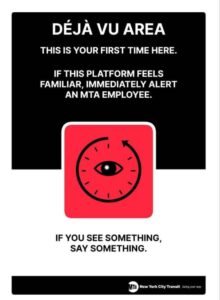
We’re all familiar with déjà vu — the false sense that what we’re experiencing right now is something we’ve already lived through in the past.
Crosby, Stills, Nash and Young described the feeling:
And I feel like I’ve been here before
Feel like I’ve been here before…
We have all been here before
‘Déjà vu’ translates as ‘already seen’. The lesser-known counterpart of déjà vu is ‘jamais vu’, or ‘never seen’. It’s the false sense that we’re seeing something for the first time, even though we know on an intellectual level that it’s familiar. For me, jamais vu occurs most often when I’m staring at a word and it suddenly looks… weird. For example, if I’m on a phone call and there happens to be some printed material in front of me, I will look at it just to give my eyes something to do. I’m not actively reading, so my eyes tend to settle on a particular word and stay there. The word starts out looking normal but at some point that changes and it begins to look unfamiliar and odd. I may even get the nagging feeling that it isn’t spelled right, but that I can’t remember how it should be spelled.
Scientists have studied the phenomenon and in fact, the 2023 Ig Nobel Prize for Literature went to a paper titled
The the the the induction of jamais vu in the laboratory: word alienation and semantic satiation
The joke title refers to the method the researchers used to induce jamais vu. Subjects were instructed to copy particular words over and over until they felt “peculiar”, which typically happened within a minute. A full two-thirds of participants experienced the phenomenon.
The lead investigators, Akira O’Connor and Christopher Moulin, published an article yesterday describing their research. It’s worth a read:

The full list of the 2023 Ig Nobel Prize winners can be found here.
This one is my favorite:
Something else that can trigger jamais vu for me is when I drive through a neighborhood at a different time of day from what I’m used to. Photographers know that lighting is everything, and the same place can feel completely different at sunset than it does at high noon. I’ve had the experience of thinking I’ve made a wrong turn somewhere, only to realize with a jolt that I’m in a place where I’ve been a hundred times before, but with different lighting.
For anyone wondering about the déjà vu sign in the OP, it’s a spoof of the New York City subway’s “If you see something, say something’ campaign:
I’ve sent some time on MTA trains, and always thought that sine was a self parody.
Goes with, if you have nothing to hide, you have nothing to fear.
This was news to me, but there’s a third “vu” to go along with “déjà vu” and “jamais vu”, and that is “presque vu”, or “almost seen”. This familiar experience is what we refer to in English as the “tip of the tongue” phenomenon, and it refers to frustrating situations where we’re certain that we know something but can’t quite retrieve it from memory.
According to this article, more than 90% of people experience it. It makes me wonder about the lucky folks who don’t ever experience it, assuming they actually exist.
I’ve had some jamais vu-like experiences lately with English idioms. For instance, I’ve been using the phrase “right away” my entire life, but only recently did the actual words jump out at me, causing me to ask “Wait — how does ‘right’ + ‘away’ = ‘immediate’?”
That sent me to the internet, where I found an old William Safire article on the word “way”. It explains:
Lol @ “neologistician”. Nice job if you can get it.
The trick is getting paid for it.
Wow — Wiktionary has a massive list of English idioms.
ETA: And snowclones!